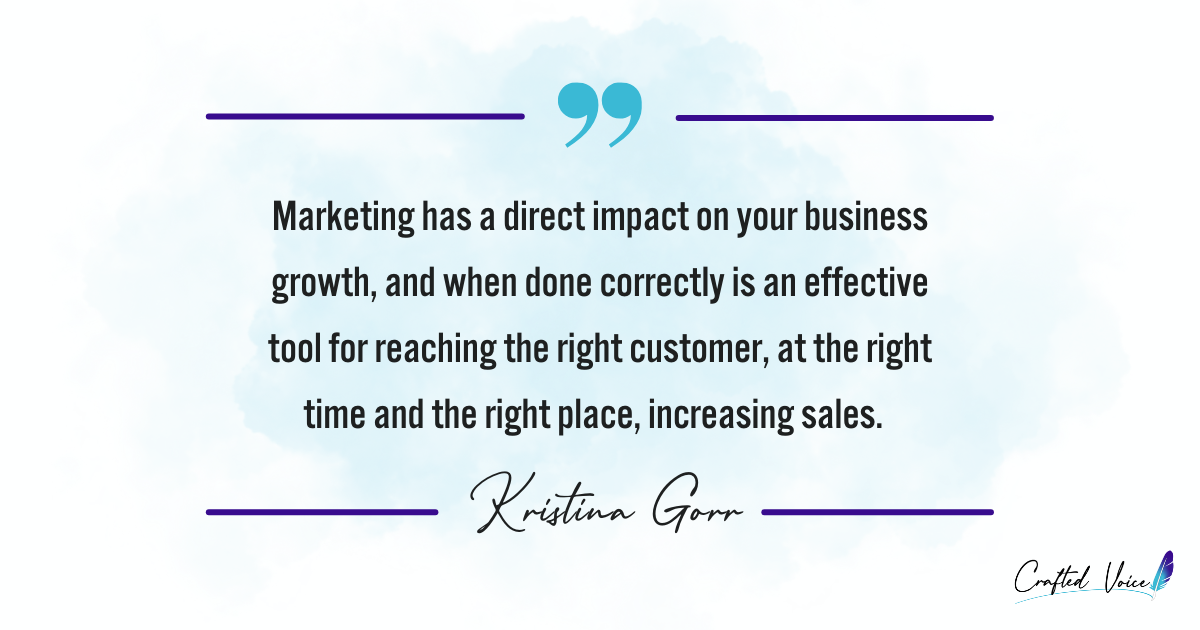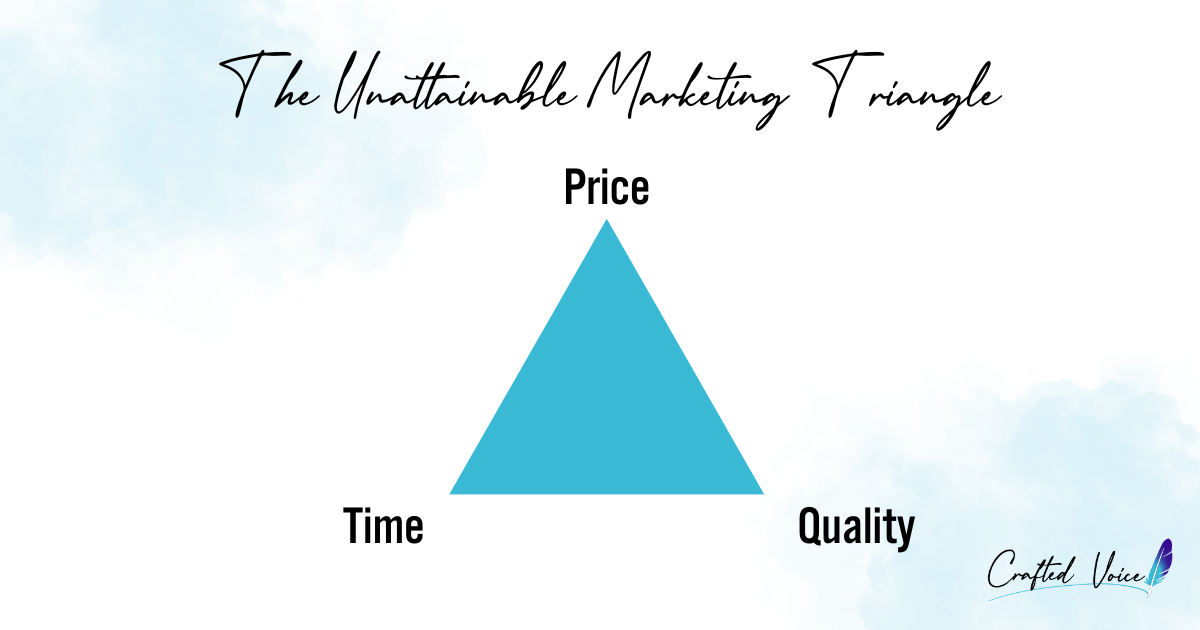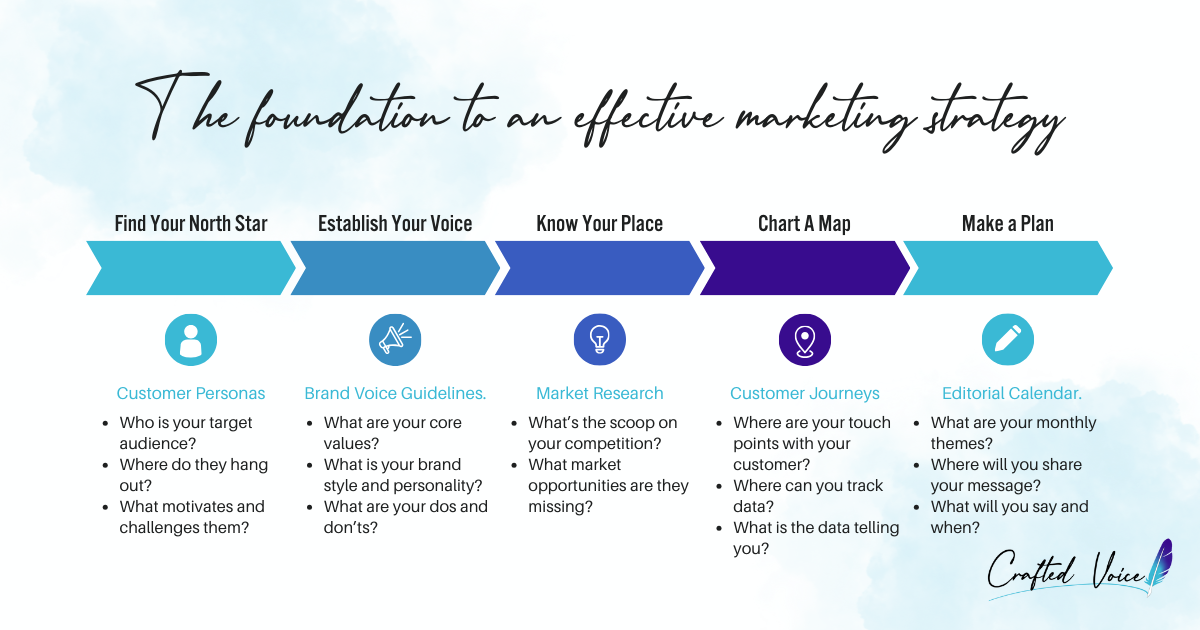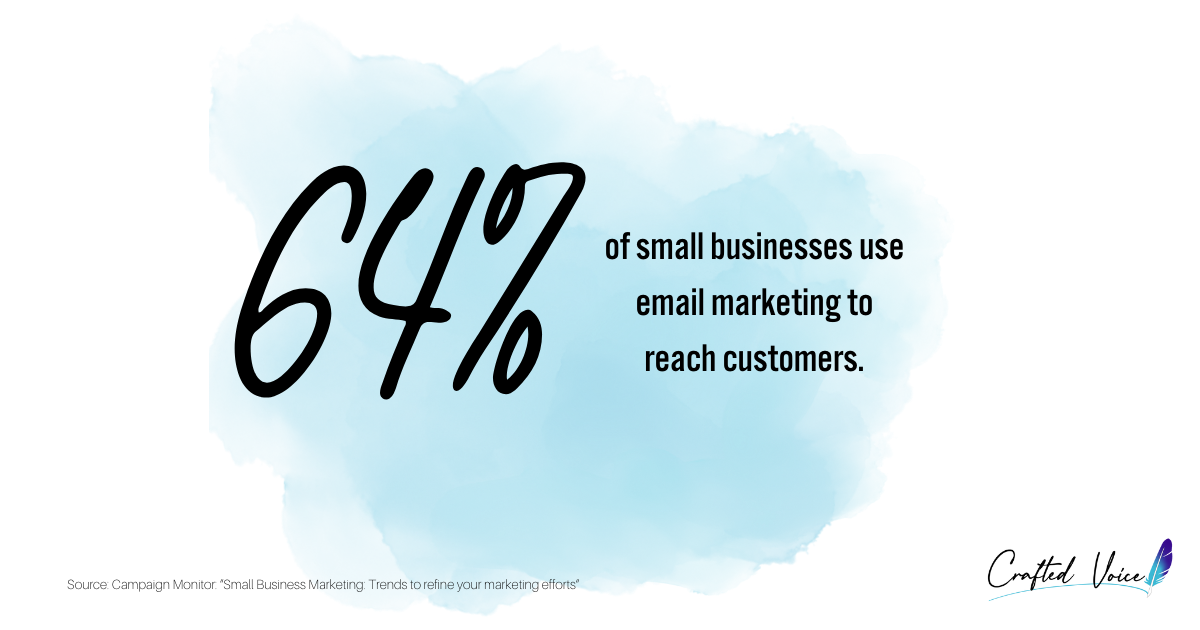Marketing For Business Owners
Practical insights and guidance on marketing DIY strategies and budget-friendly solutions for business owners.
Marketing for your small business can be overwhelming in the beginning.
The questions swirling around in your head keeping you up at night likely include:
- How do I need to market my business?
- How much money will it take for my marketing efforts to give me a return on my investment?
- Do I need to hire someone for marketing or can I do it myself?
- What type of marketing makes sense for my business?
That last one is a doozy…there are so many marketing strategies for small businesses out there, how do you know which one is right for you and makes sense for your business? Content marketing strategies, pillar-based marketing, traditional or digital advertising, inbound marketing…there are so many to consider!
Marketing for business owners can be expensive, ineffective, and scary. But it doesn’t have to be that way! With the right marketing partner in your corner, you will discover all of the answers to your questions, allowing you to sleep soundly at night knowing your business marketing is in good hands. With Crafted Voice, our affordable marketing solutions will fit your budget and set you up with a solid marketing foundation to reach your business goals.
Why Marketing is Important for a Business
The bottom line of marketing is to increase sales. Unless you are starting a business just for fun and not for the money (because you have plenty of it) your business isn’t going to last long without sales. Marketing is the effort your business takes to get the word out about your goods and/or services. And if more people know about the service you provide or the product you sell, the more sales you will make. This is called sales conversion and can be calculated by dividing the number of people who buy your goods/services by the number of people you think will buy.
Let’s consider a chocolate shop to bring this concept to life.
Without doing any marketing, word of mouth referrals (because your chocolate is incredible!) combined with location-based foot traffic attract 20 potential buyers (also called leads) into your store each day. Of those 20 people, 5 actually buy chocolates. So your sales conversion rate is 5 sales divided by 20 leads = 25%.
Now let’s say that you decide you want to grow your business and are willing to invest $250 into an ad in the local community newspaper. The ad includes a coupon for a free chocolate sample when they come into the store and spend at least $5. That’s a smart way to advertise. You can track how many people actually come into your chocolate shop from the ad, because they will hand you the coupon upon checking out.
After the ad runs, you now have 40 people coming into your store daily, and 15 of those are handing you coupons when they check out. Your first marketing win is that you’ve doubled your leads from 20 to 40 people in the store. Your second marketing win is that your sales conversion rate has increased to 37.5% (15 sales because of ads divided by 40 leads). Combine that with the other 5 sales you are getting without coupons, and your total sales conversion is now at 50%. Look at you go!
Marketing has a direct impact on your business growth, and when done correctly is an effective tool for reaching the right customer, at the right time and the right place, increasing sales.
Why is Marketing Important to Small Business owners?
Marketing for business owners who are just starting their business usually goes one of three ways:
- They do the marketing themselves.
- They hire an employee to execute their marketing.
- They hire a consultant or agency to handle their marketing.
As the business owner, how your company plans, creates, and executes its marketing strategy is ultimately your responsibility. You have to weigh the costs and benefits with your goals to determine which marketing methods will work best to effectively reach your ideal customer.

Going the DIY route for your marketing makes sense if you need a low-budget marketing solution and have the time to execute it consistently.
If you are strapped for time and have the budget, hiring an employee to help you with your marketing efforts may be the best solution. This employee can be full-time, but doesn’t have to be. A part-time marketing specialist can help you keep costs down while also having the reliability of an employee available to carry out this important task.
If your business isn’t in its infancy, or if you have nice start-up funding, hiring a marketing agency or communications consultant is another solution to ensure your marketing is professional, on-brand, and effective.
Hiring a large marketing agency or consultancy can get expensive quickly.
That’s why Crafted Voice prides itself on offering affordable marketing solutions for small business owners so that you don’t have to break the bank in order to have a high quality, effective marketing strategy.
What Do Small Business Owners Need to Know About Marketing?
You may have heard of the “unattainable triangle.” The top point represents quality, the bottom left point represents time, and the bottom right top represents price. When it comes to marketing for business owners, you want all three. You want high quality marketing, done quickly, at a low cost. Unfortunately, it’s called the unattainable triangle for a reason.

If you rush the marketing process, you will sacrifice quality because it isn’t done as well as it could have been if the appropriate amount of time was given to it.
If you choose the lowest price marketing option (such as a DIY option), it is going to take you more time because you have to do all of the work yourself, or put a lot of time into editing someone’s low-cost work.
If you hire the top marketing agency, you’ll achieve a high quality product in a (usually) reasonable amount of time, but the price is going to soar.
As the small business owner, this give and take in marketing is a challenge you must face. Crafted Voice offers affordable marketing solutions, from DIY to partner services that don’t break the break.
How To Start Marketing A New Business
You may be thinking, “This all sounds great, but what is the best way to promote a small business like mine? I want details and specific step-by-step instructions!” I’m glad you said so:
Step 1 – The first step is to decide how you want to execute your marketing. Will you DIY your marketing efforts or hire an employee on your team to do the work? Consider taking an on-demand e-courses. Or perhaps you want to hire a consultant or agency? Determine what execution method will fit your business goals best.
Step 2 – Learn everything you can about your target audience. Where does your target audience hang out? What are their challenges, motivations, and frustrations? How do they prefer to receive their news and information? What are their shopping habits? These are just a few of the questions you need to answer in order to target your marketing messages to address their specific needs and position your business as the perfect fit for them.
Step 3 – Exercise your detective skills and get to know your competition. Your competition will give you a glimpse into what’s working and what isn’t. Consider doing some mystery shopping, signing up for their emails, reading their customer reviews, and pouring over their website. Learning how they speak to their customers, and what marketing methods they are using may give you insight into what you should, or should not do. It will also help you pinpoint any gaps that you can fill to set yourself apart in the market.
Step 4 – Draft your core messaging. Now that you have a solid base for who you are targeting and what is working in the market, you can craft anchor messages that will be used in key parts of your marketing materials to speak directly to your target audience. An elevator pitch, a one-liner (think tagline), a compelling story, and brand voice guidelines are just a few of the marketing messages you can develop as part of your core messaging.
Step 5 – Put together a plan of action. Will you publish a newsletter? Will you post to social media? Does it make sense for you to publish blogs to your website? If so, how frequently? Creating an editorial calendar to help you organize your marketing game plan will give you the direction you need to make it happen.
Step 6 – Be consistent. You know that editorial calendar from step 5? Commit to stick to your plan when it comes to frequency of posting. Being consistent is the best way to stay top of mind with your customers and to strengthen your brand presence and image.
Step 7 – Listen to your customers. Afterall, they are the whole reason you are in business! Provide an easy way for them to talk to you – setting up a post-purchase feedback form is a great way to let them know you welcome their input. Keep an eye out for both positive and negative feedback that may come in other ways too – online, third party reviews, and chatter online, for example. Proactively solicit testimonials and success stories from your customers so that you can use it in your future marketing materials as well.
What Are The 5 Main Marketing Strategies?
The seven steps listed above give you a quick hitting overview of what you can do to get started marketing your small business. There are many creative and budget-friendly ways to market your business within this framework.

There are 5 marketing strategies for small business that will establish your brand as professional, the expert in the market, and most importantly, will help you reach your business goals:
- Customer Personas
- Brand Voice Guidelines
- Competitor Analysis and Target Audience Research
- Customer Journey Mapping
- Editorial Calendar
What Type Of Marketing Is Best For Small Business?
The type of marketing activities your business should utilize depends on a number of factors. Here are questions that every business owner should ask when considering what type of marketing is best for their business.
- Where does my target audience hang out?
- How does my target audience prefer to receive their information?
- What is my marketing budget?
- How much time am I willing to invest in marketing?
- What marketing works well for my competition?
Uncovering the answers to these questions will direct your marketing decisions so that you are not wasting your valuable time and money on efforts that do not provide a return on your investment. For example, if you know your audience hangs out on Instagram, but is not on LinkedIn, don’t waste your time posting to LinkedIn. If you have a tight marketing budget, running ads on every platform known to man isn’t the way to go. Instead, focus your money on organic, inbound marketing or just choose one advertising platform.
Is Email Marketing Good For Small Business?

Email marketing is one of the most popular marketing methods out there. But is email marketing for small businesses the best method for you?
According to Campaign Monitor, 64% of small businesses use email marketing to reach customers.
Email marketing can be highly beneficial for small businesses for several reasons:
Email is cost-effective. Compared to traditional marketing methods, email marketing is relatively inexpensive. Even small businesses with limited budgets can reach a large audience without breaking the bank.
Marketing through email provides an opportunity for targeted reach. With email marketing, you can segment your audience based on demographics, behaviors, or preferences. This allows you to send targeted messages to specific groups – like your customer personas – so that they receive the exact message they need to hear to engage with your brand. You can address their challenges, leverage their motivations, and set yourself as the perfect solution to their problem.
Email marketing boosts relationship building with your customers. Email marketing allows you to build and nurture relationships with your audience. If you do email marketing right by providing valuable content, personalized offers, and timely updates, you will establish trust and credibility with your subscribers. They won’t be able to help themselves from becoming loyal customers!
Email marketing provides measurable results. Most email marketing platforms offer analytics tools that allow you to track open rates, click-through rates, conversion rates, and other key metrics. This data can help you measure the effectiveness of your campaigns and make informed decisions to improve future marketing efforts across the board.
Regular emails keep you top of mind with your customers, which can increase sales. By regularly communicating with your audience with emails, you are reminding them that you exist. On top of that, your emails will also drive traffic to your website, promote your products or services, encouraging sales.
While email marketing can be a valuable tool for small businesses to build brand awareness, drive sales, and foster long-term customer relationships, it’s essential to develop a strategic approach, provide valuable content, and comply with data regulations (such as GDPR and CAN-SPAM) for ultimate success. Working with a trusted marketing partner is the best way to ensure you are making the most of your email marketing efforts to reach your business goals.
How To Market Your Small Business On Social Media
The quick answer to this question is that you should target your social media content to your ideal customer, be authentic in your messaging, and post consistently. Post where they hang out, which you should know from building a customer persona and doing target audience research.
Here is my surprising, long answer (perhaps shocking answer coming from a marketing professional):
As a small business owner, you should think long and hard about investing in social media marketing before you make the decision to pursue this method of digital marketing. These are fighting words in many marketing circles, because OF COURSE YOU HAVE TO BE ON SOCIAL MEDIA. But do you, really?
Here’s why I caution social media marketing for small businesses, especially those with little to no budget:
Social media marketing is a time-suck. You spend hours upon hours writing good, targeted content, creating trendy graphics and videos, researching the right hashtags and what other accounts to tag. Then you spend more time scheduling these posts to get little to no engagement because the platform algorithms make it hard for you to get reach without “boosting” your post or paying to advertise. For the amount of time you’ve just spent creating this content, it’s disappointing to only get 5 likes and no comments. In response, you find other accounts to engage with, posting on threads, liking posts, and following other accounts, hoping that they will return the favor. More time spent with little to show for it.
Social media marketing is a budget-drain. As mentioned above, the platforms want you to spend money in order to gain traction for your posts. While it’s possible to spend as little as $10-25 per ad on some social media platforms, the reality is that you need to spend hundreds, if not thousands to achieve impressive engagement numbers. On top of the time you just spent on strategy and content development (either your own time that could have been spent on other things, or you paid someone else to do it for you), you now have to spend even more money to see results.
Social media marketing is life-sucking. There is evidence that social media use causes depression, anxiety, and stress. A publication from the National Library of Medicine states:
“A number of studies have been conducted on the impacts of social media, and it has been indicated that the prolonged use of social media platforms such as Facebook may be related to negative signs and symptoms of depression, anxiety, and stress. Furthermore, social media can create a lot of pressure to create the stereotype that others want to see and also being as popular as others.”
This is just one study (of at least dozens), all saying the same thing. Before embarking on a social media journey with your business, consider if you (or your hired help) can avoid these negative mental health effects and if you want to be a part of a platform that may be causing your customers to have poor mental health.
If you feel that you absolutely must be on social media and it does make sense for many businesses), consider posting to have a presence, but not relying on it for your main source of sales leads. Set up a page, post regularly, but don’t focus on it as your main marketing strategy for all of the reasons listed above.
Alternatives to Social Media Marketing
So if you aren’t on social media, how are you supposed to reach your customers? Not using social media gives your brand the opportunity to leverage more creative marketing strategies for business.
Here are a few marketing activities examples that do not rely on social media use:
- On the Writing Off Social Podcast, co-host Mary K shares how her ministry, New Mercies For Moms, uses a radio spot to share their devotionals on air. This prompts listeners to subscribe to their newsletter, and buy their devotional card sets. The team creatively pursued the radio spot by building relationships within the station’s team, and paid nothing (yes, $0!) to have the radio spot. [As a side note, the Writing Off Social podcast targets Christian Women authors, but has incredible resources and ideas for any business that wants to get off of social media and creatively build their audience elsewhere. I highly recommend it!]
- Crafted Voice Communications has intentionally decided to not have a social media presence, instead focusing on Pillar-Based Marketing to boost search engine page 1 rankings. Pillar-Based marketing is a search engine optimization method, taking into account how people utilize search engines today (asking questions, for example, instead of just keywords).
- Parents Pivot, a company that helps parents return to paid work after a career break, builds their email list using a “lead magnet.” A lead magnet is a free resource that potential customers can access in exchange for their email address. According to MailMunch, 66% of online consumers made a purchase as a result of email marketing!
These are just three examples of how other small businesses just like yours built their customer base without the use of social media. Want even more ways to market your business without social media? Sign up for our free creative marketing methods resource (yes, this is a lead magnet!)
What Are Examples Of Marketing Options For A Small Business Owner?
Marketing strategies often include activities such as website development, blogging, newsletters, and social media. Other common marketing activities include lead magnets, digital ads, mailers, storytelling, in-person networking, speaking engagements, and more.
Here are a few examples of effective marketing solutions for business owners:
Huxley CPA uses compelling storytelling to bring her financial lessons to life for her target audience: business owners. From ghostbusters to leaping unicorns, from fire marshalls to golf caddies, each article from Huxley CPA is a new adventure with new financial lessons. This creative storytelling is the anchor for all other marketing efforts, which means pulling the story into her monthly newsletter and social media for maximum impact. It also strengthens her SEO and website’s digital presence.
Jennifer Johnson brings her magnetic personality into every aspect of Network in Action groups. As a franchise owner, she is a powerful connector of people, and it’s clear on her website, in her newsletters, and from her LinkedIn presence that she fully shows up for her customers. Relationship building, which is what she does best, is her strongest marketing ally.
Beyond Inclusion Group sends out a monthly newsletter that provides value to their target audience: companies looking to establish an inclusive workplace culture. Each month the newsletter begins with a letter from the Founder, Maria, providing insight into a relevant topic. This is followed by resources, tools, events, and news that support the monthly topic, and provide value to her audience. She also includes a team spotlight, a testimonial of a happy client, and a services spotlight so that her customers know she is there for them when they need her.
Can You Do Marketing For Free?
If you are looking for low cost marketing ideas for small businesses, there are several ways you can utilize marketing resources for free, or with a small budget.
Social media marketing is “free” in that you don’t have to pay to have a page and post content. It will take your time to create the content, graphics, and to maintain your presence but can be done in a DIY fashion to keep expenses down.
Email marketing is another strategy that can be executed for free, as many platforms have a free plan if your subscriber list is small. You can set up a template and send emails at no cost other than your time.
Word of mouth marketing is perhaps the very best free strategy. Happy customers are almost always willing to share with others the “gem” they’ve found in your business. Brainstorm ways to incentivize word of mouth referrals. Perhaps you can offer 10% off for every referral received from a loyal customer, or they get a small, free gift when they refer someone new.
Setting up a strong website presence can also be a low cost way to promote your business online if you are able to do some heavy lifting yourself. Consider the free website guys to develop your website if you don’t want to DIY it. (They built the website for Crafted Voice). Draft the content and drop it into the website structure. If you do SEO the right way, you’ll be showing up on page 1 rankings when people search for relevant terms – all for free!
Craft Your Marketing With Confidence
If you are doing your research on marketing for business owners, chances are you are going to be doing the work yourself – at least for a while. Even with a DIY approach, you don’t need to feel like you are on your own. By partnering with Crafted Voice Communications, you can develop high-quality, professional marketing resources that target your ideal customers in a way that motivates them to buy. You’ll go from feeling overwhelmed and chaotic in your marketing efforts to organized and confident that you are doing what’s best for your business.
Reach Us
Our home-base is Columbus, Ohio in the Eastern Time Zone. We’re proud to serve business owners from coast-to-coast.
Together, let’s craft your story and captivate your audience!
Hilliard, Ohio
